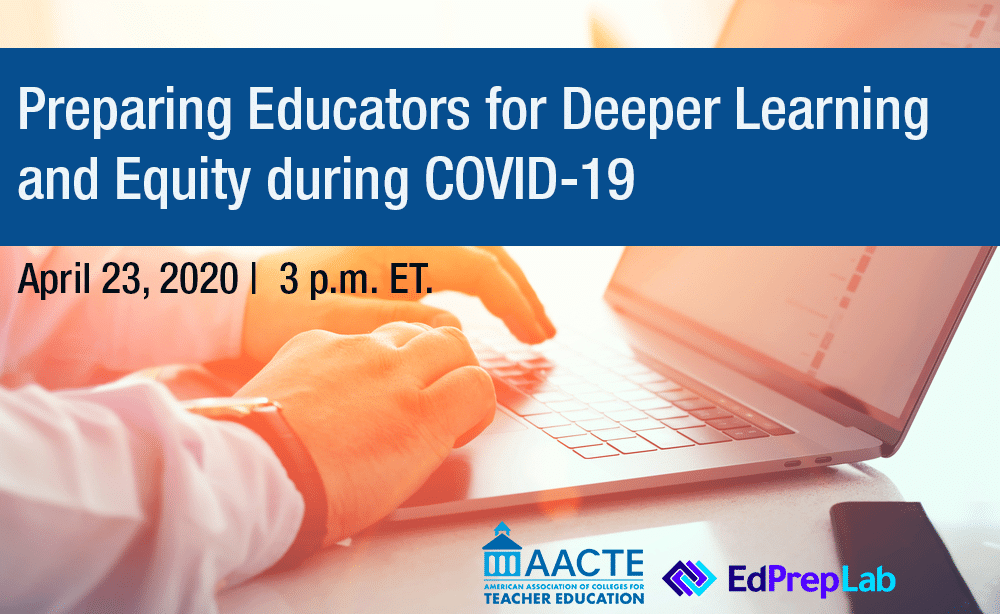09 Apr2020
AACTE Responds to COVID-19
By Lynn M. Gangone

To help AACTE better understand and help members respond to the unprecedented challenges that COVID-19 has created for educator preparation, AACTE distributed a survey today to targeted members. The member survey was sent to senior leaders with responsibility for a school, college, or department of education such as deans, associate deans, vice presidents, or department chairs.
If you received this survey, AACTE needs to hear from you and will use your responses to
- determine the support members need;
- inform the public and policy makers about how the coronavirus is affecting educator preparation; and
- share aggregated information with members to help you benchmark your experience against your peers.
09 Apr2020
AACTE Responds to COVID-19
By Jerrica Thurman

AACTE and the Educator Preparation Laboratory will present, “Preparing Educators for Deeper Learning and Equity during COVID-19,” on Thursday, April 23, 3 – 4 p.m. ET. This webinar features leaders from preparation programs around the country who are members of the Educator Preparation Laboratory network, an initiative of the Learning Policy Institute and Bank Street Graduate School of Education.
As school districts and universities across the nation adapt to distance learning, how are educator preparation programs responding? How are they meeting their candidates’ needs right now? What are they doing to prepare for the future? In this climate of uncertainty, it is more important than ever to ensure teachers and leaders are being prepared to provide deeper learning opportunities to all students, especially those from our most vulnerable populations. During the webinar, the presenters will explore pressing questions around teacher and leader preparation during the COVID-19 crisis, including:
09 Apr2020
AACTE Responds to COVID-19
By University at Albany

The University at Albany School of Education, in order to support a greater need for remote learning in K-12 education, on Wednesday launched the website Remote Education Resource Center, or RemoteEd.
The site, which has immediate critical value in the current coronavirus crises, will not only help teachers incorporate remote learning tools into their classes, but also foster a community of practice in the Capital Region. RemoteEd had its unveiling on Wednesday during a webinar with area teachers.
“The School of Education at the University at Albany has a deep purpose and commitment to assist the special, urgent needs of teachers, leaders and schools to support student learning in this current dynamic time,” said Jason Lane, interim dean of the School. “Our faculty and graduate students have worked tirelessly to bring this resource to reality. We’re all in this together to support our children and students.”
09 Apr2020
AACTE Responds to COVID-19
By Lauren Weitlauf
This article originally appeared on the Western Kentucky University WKU News site and is reprinted with permission.
With the help of faculty and partnering school districts, Western Kentucky University student teachers Ian Harper, Theresa Price, and Hallee Black, among other candidates, immediately went to work developing an alternative learning plan for their classrooms in light of COVID 19 mitigations. Overnight, non-traditional instruction, or NTI, became a mantra and a motive with each candidate pulling tools and resources from their arsenal of lessons learned during their time at WKU.
“Our Topper teacher candidates have stepped up in a big way,” said WKU Office of Professional Educator Services Director, Stephanie Martin, as she reflected on the days leading into alternative learning.
“I had professors at WKU that prepared us for NTI days inadvertently,” said Ian Harper, middle school social studies and language arts major from Bowling Green. Harper currently serves eighth grade students at Drakes Creek Middle School in Bowling Green and said that, even in this “worst case scenario,” WKU faculty and Warren County teachers helped him adapt to the current unprecedented situation thanks to their commitment to technology-based resources.
07 Apr2020
AACTE Responds to COVID-19
By Katrina Norfleet

While everyone across the globe is trying to cope with the public health crisis, college students are especially vulnerable as they are now disconnected from campus communities, resources, and the structured academic year they were anticipating. Learn how faculty can support students with anxiety as they seek answers about what comes next: Will they graduate? As the virus spreads, how long will their health and the health of loved ones be at risk? Will campus reopen in the fall?
The Chronicle of Higher Education has released a compilation of articles on how faculty can help students cope with the stressors associated with navigating the coronavirus pandemic. The 28-page special issue, available for free, includes eight previously published pieces that together serve as a resource tool for adapting to this new scenario:
07 Apr2020
AACTE Responds to Coronavirus
By Jerrica Thurman
In recent interviews, AACTE Director of Marketing and Communications Jerrica Thurman met with six members of the AACTE Board of Directors to discuss how they are managing their university’s response to COVID-19. The interview participants were Patricia Alvarez-McHatton, Marquita Grenot-Scheyer, Robert Floden, Dale-Elizabeth Pehrsson, Carine Feyten, and Monika Shealey.
All participants were asked, what words of advice or lessons learned would you share with other university leaders or college deans about what you have experienced so far in your crisis response planning for the coronavirus? Here’s what they had to say:
 Patricia Alvarez-McHatton
Patricia Alvarez-McHatton
Executive Vice President for Academic Affairs
University of Texas, Rio Grande Valley
“We have our academic affairs leadership team in which we bring all the chairs, directors, and deans together on a monthly basis. It just so happened, fortuitously, that our March meeting was scheduled prior to when this all began. We placed participants in heterogeneous groups and had them respond to five guiding questions about things to think about should this situation materialize as it has. I think it brought people together. It generated an awakening and understanding of the things that we need to think about. We were able to learn from each other. It became clear that first and foremost we need to empower and have faith in our faculty’s ability to do what needs to be done.
07 Apr2020
AACTE Responds to COVID-19
By Lynn M. Gangone and Jacqueline Rodriguez

With the onset of the coronavirus (COVID-19), school districts, institutions of higher education, and educators are finding themselves in uncharted territory. As schools across the nation are forced to shut their doors, finding ways to best serve all students equitably has never been more urgent. This is especially true for our most vulnerable students—those with disabilities.
COVID-19 hit hard and fast. And with that, so did the shift from in-school instruction to online learning. We know that special education students receive, consume, and apply information differently in face-to-face settings versus online environments. However, the rapid onset of COVID-19 did not give educators, parents, or students time to adequately prepare for the transition.
07 Apr2020
By Deborah Koolbeck
As the COVID-19 pandemic led the U.S. president to declare a national emergency, education stakeholders began immediate, direct advocacy with the Congress and the Administration, and will continue as federal and congressional actions to address the COVID pandemic unfold. AACTE continues to advocate for educator preparation on Fiscal Year 2021 funding, in particular, and emergency spending packages (often referred to as supplemental measures/bills) with both legislative branches.
When AACTE staff and members talk about advocacy, we talk about the power in the combined voices of stakeholders and partners. To that end, AACTE has joined other education organizations in augmenting the voices on key issues as they emerge with the Administration and the Congress. You can access these letters via the AACTE COVID-19 Resource Hub located under AACTE Advocacy: Letters to Congress, the Administration, or other Leaders. Such letters include one that addresses the release of the Title IX regulations and rapid deployment of the funding from the third stimulus package, the CARES Act.
This section of the COVID-19 Resource Hub will be updated as AACTE signs on to letters for actions related to the COVID-19 pandemic
07 Apr2020
By Jerrica Thurman

AACTE continues to seek opportunities to support its members in navigating through the unprecedented educational challenges the coronavirus has caused. It is exciting to discover how AACTE members are exploring innovative pathways and solutions to the complex problems and are eager to share with the educator preparation community. Next week, AACTE and Old Dominion University will co-sponsor a 60-minute webinar featuring education faculty advising world nations on COVID-19, Wednesday, April 15 from 2:00 – 3:00 p.m. The webinar is open to all AACTE members.
06 Apr2020
AACTE Responds to COVID-19
By Lynn M. Gangone
During this unprecedented time, AACTE’s number one concern is you, your loved ones, your colleagues, and your institutions. We will get through this together! While we all navigate the impact of the coronavirus, AACTE is working to provide you support through its COVID-19 Resource Hub and collaborations with key stakeholders from the field. Please take a few minutes to watch the video above and learn more.
06 Apr2020
AACTE Responds to COVID-19
By Meghan Grenda
 AACTE cares deeply about our members and is thinking of everyone in our community during this uncertain time. As such, AACTE is engaging in multiple efforts to support our members as we adapt to new normal in the time of COVID-19.
AACTE cares deeply about our members and is thinking of everyone in our community during this uncertain time. As such, AACTE is engaging in multiple efforts to support our members as we adapt to new normal in the time of COVID-19.
One resource we know will be of use is a listing of institutions of higher education and how their operating status has changed due to the pandemic. You may view the document that has aggregated data about colleges and universities that have closed or migrated to online instruction within the past few weeks.
Please note this resource is not complied by AACTE and AACTE does not endorse this information. The information contained in this document is open-source and not populated by AACTE staff or members.
06 Apr2020
AACTE Responds to COVID-19
By Jane E. West
This blog post is written by AACTE consultant Jane West and is intended to provide updated information. The views expressed in this post do not necessarily reflect the views of AACTE.
Implementation of CARES Act – Third COVID Relief Package
The Administration is moving to implement the massive $2 trillion COVID response bill (known now as COVID-3) which was enacted on Friday, March 27 . For education, this means $30.75 billion for an Education Stabilization Fund that includes:
- $13.5 billion for elementary and secondary education (can be used for any activity authorized under major education laws including ESSA, IDEA, CTE and Homeless Education)
- $14.25 billion for higher education; At least 50% is for emergency financial aid to students and expense related to the pandemic
- $3 billion for governors to be used for emergency grants for the most affected local education agencies, institutions of higher education and those deemed essential to providing childcare, early childhood, K-12 or higher education services
06 Apr2020
AACTE Responds to COVID19
By Linda Minor


At AACTE, we continue to monitor the rapidly changing situation related to the spread of COVID-19. We understand that concerns for health, safety, and the impact on meeting attendance, among other issues, are affecting our members.
Keeping this in mind, AACTE has made the decision to move its June meetings to later in the year:
Washington Week will now take place September 8 – 11. The location remains the same: Renaissance Arlington Capital View Hotel. Check aacte.org for the revised schedule of events.
Leadership Academy has been rescheduled to October 3 – 8. The location remains the same: Renaissance Tampa International Plaza Hotel. Visit the aacte.org for the revised schedule of events.
AACTE is committed to maintaining all appropriate sanitary, health, and safety measures, and encourages attendees to follow guidelines recommended by the Centers for Disease Control and Prevention and the World Health Organization.
Please note that due to the ongoing uncertainty regarding the coronavirus, AACTE will not charge a cancellation fee if you decide not to attend an in-person event based on concerns around your health or travel.
31 Mar2020
AACTE Responds to COVID-19
By Weade James

In light of the COVID-19 pandemic, higher education institutions and its students are facing significant challenges and uncertainties. Graduate students enrolled in colleges and schools of education, in particular, have had to respond to the current circumstances and find solutions to continue their academic pursuit and scholarly productivity. AACTE recently interviewed three graduate students from our member institutions about how the current crisis has affected them. The following themes emerged from these interviews.
Challenges with Adapting to Distance Learning
As a result of campus closures, graduate students have found themselves having to engage in distance learning fully. Although some have had experience in taking and teaching online courses, there are still unique challenges when all learning occurs virtually. These challenges are more common for students who are parents and have to oversee instruction for children in PK-12 schools during daytime hours. Additionally, students who are in a household with multiple adults teleworking or engaging in distance learning places a strain on their ability to focus and on resources like Wifi connectivity. Graduate students have expressed having to complete their studies during abnormal hours due to these distractions in their home environments.
30 Mar2020
AACTE Responds to COVID-19
By Wendy Murawski

This article originally appeared on the ASCD InService blog and is reprinted with permission.
Social distancing. Stay-in ordinances. Home schooling. Experiences many of us never thought we would be living at the beginning of 2020. Now, the “new normal,” at least for the near future, involves students of all ages at home all day and parents trying to move their work to a virtual format. Managing the stress of change is a lot, but trying to do it while entertaining a kindergartner or overseeing a high-schooler’s online activities is enough to ramp up anyone’s stress level.
Just as businesses are trying to figure out how to sustain their work by renegotiating how to run the corporate world, so too must parents and caregivers renegotiate how things are done at home.











 Patricia Alvarez-McHatton
Patricia Alvarez-McHatton

 AACTE cares deeply about our members and is thinking of everyone in our community during this uncertain time. As such, AACTE is engaging in multiple efforts to support our members as we adapt to new normal in the time of COVID-19.
AACTE cares deeply about our members and is thinking of everyone in our community during this uncertain time. As such, AACTE is engaging in multiple efforts to support our members as we adapt to new normal in the time of COVID-19.


